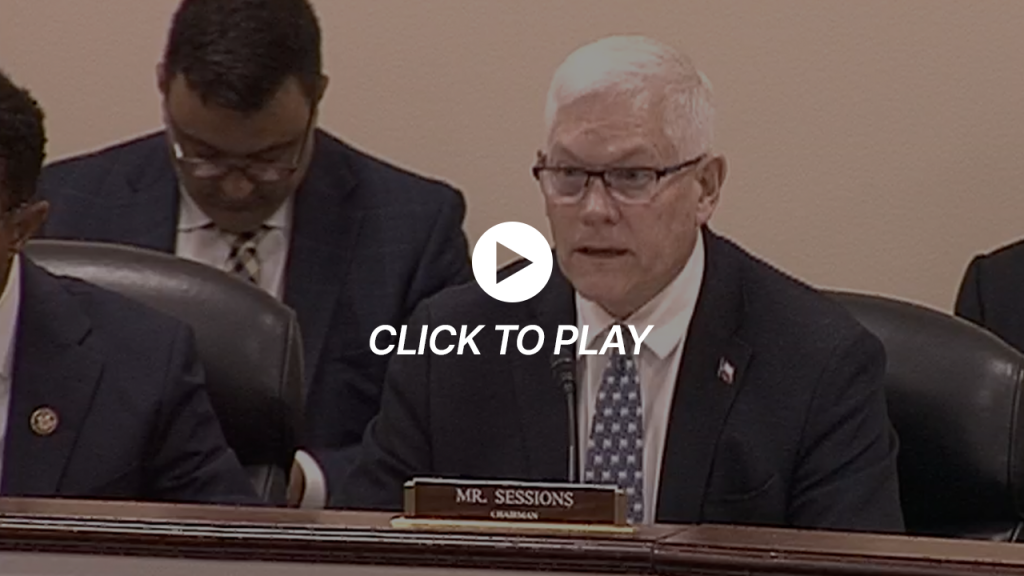
Sessions Opens Hearing on DOD’s Progress Toward a Clean Financial Audit
WASHINGTON—Subcommittee on Government Operations Chairman Pete Sessions (R-Texas) delivered opening remarks at today’s hearing on “Tracking Progress: Updates to DoD’s Financial Management Scorecard.” Since the Department of Defense (DOD) has never passed a comprehensive audit, Subcommittee Chairman Sessions emphasized that financial transparency of the military is critical to ensure stewardship of taxpayer dollars and military readiness. He detailed how the Government Operations Subcommittee, with the assistance of the Government Accountability Office (GAO), created a scorecard to track DOD’s progress towards achieving a clean audit opinion. He concluded by thanking the witnesses for appearing at the hearing to discuss DOD’s progress and what challenges remain toward better financial management.
Below are Subcommittee Chairman Sessions’s prepared remarks.
Welcome to today’s hearing regarding updates to the Department of Defense’s progress towards achieving a clean audit opinion.
I’d like to thank our witnesses for testifying today on this very important topic.
I’d also like to thank subcommittee members—on both sides—for staying committed to shining a light on the financial management issues that the Department of Defense faces and working towards a solution for the future.
I have said this before. Financial transparency of the military is critical.
How can we remain confident in the Department of Defense’s ability to protect American interests if they cannot properly monitor their expenses or assets?
We are here today because the Department of Defense is still unable to achieve a clean audit of their financial statements.
In fiscal year 2024, the Department of Defense reported more than $909 billion dollars—half the discretionary spending of the United States—but still holds the distinction of being the only federal agency that never passed a comprehensive audit.
The Department of Defense has more than twenty-eight components, and it’s fair to say that some are doing better at financial management than others.
For this past fiscal year’s audit, components that could not be audited accounted for at least forty-four percent of DOD’s total assets and at least sixty-eight percent of the DOD’s budget.
This is important.
A financial audit isn’t just a paper exercise.
Understanding where your assets are and how much taxpayer funding is left is important to have a complete picture of our military readiness.
Even though roughly half of DOD passed, the services—who receive the most amount of money and own the most assets—account for the areas where they are struggling to track their spending.
“Balancing the checkbook” is just as important as military preparedness and I believe these two ideas go hand in hand.
Financial security is national security.
The Joint Strike Fighter Program is a multiservice, multinational program that will cost more than $2 trillion dollars over its lifetime according to GAO.
For the fiscal year 2024 audit, auditors found that DOD management did not account for, manage, or report Joint Strike Force Fighter government property.
Not fully reporting this information resulted in material misstatements in DOD’s assets.
Because DOD could not provide reliable information to verify the existence, completeness, or value of the program’s government property, auditors were unable to quantify the amount of these misstatements.
This means there are monetary and operational gaps.
Last September, this subcommittee, with the help of GAO, created a scorecard to track DOD’s progress towards achieving a clean audit opinion.
Rather than continuing to say that DOD isn’t doing a good job making progress towards achieving a clean audit, we wanted something that would show us if they were getting better or worse.
This is especially important because DOD is mandated to achieve a clean audit opinion by December 2028.
Today we plan to discuss the progress that DOD has made and the challenges that they face.
As the new Administration is planning for the future, it will be imperative to understand where the Department has been, where it needs to go, and what is standing in the way.
Today we are also unveiling a new section of the scorecard that focuses on fraud risk management.
We have talked about fraud prevention for many years, so I am very excited to see a method to track progress in preventing fraud in the areas of procurement and contracting.
Strong financial management systems are an important part of fraud prevention.
What we’ve seen over the years is that DOD has struggled maintaining and updating these systems.
Last Congress we were told that for DOD to achieve a clean opinion by December 2028, they need to make significant progress by 2026.
This is why we are here, having this discussion.
Today we will hear from experienced witnesses who can tell us more about the progress that has been made and the challenges DOD is facing.
We will also hear from one service that achieved success.
Unfortunately, the Office of the Secretary of Defense will not be a part of the conversation today and they will be missed.
We hope that they will use this opportunity to listen and learn so that they can chart a path towards achieving success.
We look forward to hearing from them in the next few months as we continue oversight over this very important issue.
Today, hopefully, we can have a transparent, constructive discussion that will help move us in the right direction.
And, with that, I yield to Ranking Member Mfume for his opening statement.
Distribution channels: U.S. Politics
Legal Disclaimer:
EIN Presswire provides this news content "as is" without warranty of any kind. We do not accept any responsibility or liability for the accuracy, content, images, videos, licenses, completeness, legality, or reliability of the information contained in this article. If you have any complaints or copyright issues related to this article, kindly contact the author above.
Submit your press release
